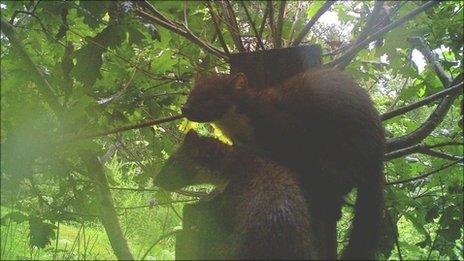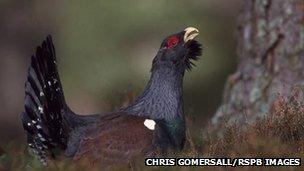Pine marten fear for capercaillie
- Published

The pine marten is one of Scotland's rarest native mammal species
Gamekeepers are warning capercaillie could be lost from Scotland for a second time, unless steps are taken to control pine marten numbers.
The pine marten is one of Scotland's rarest native mammal species but the capercaillie population is falling.
The Scottish Gamekeepers' Association believes pine martens are having a major impact on the iconic species.
RSPB Scotland says the SGA's position is "riddled with basic inaccuracies and sheer prejudice".
The capercaillie, a huge, woodland grouse, became extinct in Scotland around 1785 but was reintroduced, using birds from Sweden, just over 50 years later.
Important factor
There are fears that the capercaillie will once again become extinct in Scotland, although the reasons for the population decline are complex and often disputed.
Gamekeepers argue predation by pine martens is an important factor which has been ignored by scientists and conservation groups.
The SGA is calling on the government agency, Scottish Natural Heritage, to introduce licences to allow pine martens to be controlled.
That could involve trapping and relocation or culling.
A spokesman for the SGA said: "Predation levels across the board have risen and are now far too high for capercaillie numbers to get above the levels required to be safe.

There are fears that the capercaillie will once again become extinct in Scotland
"The argument from conservation groups has been that there is insufficient forestry, yet there is more forestry now than there was when capercaillie were flourishing.
"There is little point in wasting public money in creating new habitat (for capercaillie) if you don't control the predators that are eating them."
Scottish Natural Heritage accepts that pine martens do, sometimes, feed on capercaillie eggs but points out the species relies on a wide range of food sources, including insects, carrion, berries, small animals and birds.
An SNH spokesman said: "There are a number of possible reasons for the declines in capercaillie numbers. Predation is just one of these, and in order to make sure that we focus our collective effort and resources in the right place we need to be able to establish the cause of these declines and how we should best tackle them.
"If objective research demonstrates that pine martens are causing declines in this species then the full range of options, including licensed management of those predators, should be considered."
RSPB Scotland also argues it is a mistake to focus on the effects of predation in isolation.
James Reynolds of RSPB Scotland said: "It is a great shame that the SGA do not direct more of their energy to trying to solve the challenges that threaten our most vulnerable species, rather than exaggerating an issue and trying to apportion blame for it to one particular sector.
"This lamentable attitude presents a very real impediment to helping this species fully recover from a difficult period."